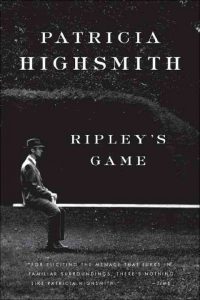The Allure of the Serial Killer Hero
Patricia Highsmith’s Ripley novels never fail to lure me into rooting for the murderous hero. It seems that I am far from alone. There is a proliferation of articles with titles such as The New American Hero: Dexter, Serial Killer for the Masses. Nonetheless, I can’t help but question my own moral fragility and puzzle more generally about why so many readers come to love these male serial killers who mutate into likable idols.
Tom Ripley. Hannibal Lecter. Dexter Morgan. These three are my personal favorites. They may be deadly, but they are redeemed by their charm. None of them is dull. All move seamlessly between suavity and cruelty, between refinement and the grotesque. All are physically attractive, but in idiosyncratic ways (think of Lecter’s compelling maroon eyes). All are charismatic, stylish, intelligent, and cultured, with admirable and unique abilities. Above all, they are dryly ironic and witty.
Generally, these characters do not kill simply for pleasure or personal gain. Rather, they subscribe to some form of a moral code, however flawed. The abject fictional serial killer, by contrast, murders primarily for sexual gratification. Typically, he is portrayed as a troll-like monster such as Buffalo Bill, who keeps his victims in a sordid basement.
In Lecter, Dexter, and Ripley, though, there is an aesthetic involved in which murder is sometimes associated with a sophistication of taste. Hence, in Ripley Under Water, Ripley is as offended by his new neighbors’ vulgarity as by their potential to expose his past crimes and thereby disrupt his contented existence tending his wine cellar, painting, and playing the harpsichord. And Lecter famously sips Amarone between bites of a victim’s liver.
Despite these characters’ abhorrence of bad manners and any form of ugliness, their refinement can slip into crudeness. Ripley, of course, fears that his crimes will be revealed. But he has an equal dread of being exposed as lower class and not belonging to the gentrified world he fought to inhabit. In a show of sinister empathy that belies any clichéd notion that serial killers do not have the ability to understand the feelings of others, Lecter knows exactly how to taunt the mother of a missing woman. He asks if she breastfed, taking “a single sip of her pain” and finding it “exquisite,” and then tells her, “Love your suit.” Repeatedly in his novels, Harris suggests that empathy without compassion can be used as a weapon.
These clever fictional serial killers have much in common with the literary rake, the Don Juan figure who has little conscience but a psychological perceptiveness that allows him to manipulate others. These rakes are cultured men of taste. In this they resemble Dexter, whom we see in the opening credits shaving, carefully preparing and chewing his breakfast, then dressing; and Ripley, who kills to protect his country-gentleman lifestyle; and Lecter, who in another act of sinister empathy, persuades Miggs to swallow his own tongue as punishment for throwing semen at Clarice Starling. “Discourtesy is unspeakably ugly to me,” Lecter tells her.
Dexter has a clear “code” of vigilante justice and a moral framework for crimes that readers more readily accept because he is dispatching evil murderers and sexual predators. In Ripley’s Game, the hero’s victims are members of the Mafia. There has always been a vigilante element within the crime genre in which the individual is set against the system. Detective heroes are often alienated from their police organizations—they are almost vigilantes—and the division between the hunter and hunted collapses in interesting ways.
As Dexter progresses, the main character breaks his code never to kill innocents, slaughtering supposed villains who are not guilty, as he later learns. This is one of the primary arguments against the death penalty. Dexter, like the criminal justice system, is not immune to mistakes. He also flirts with the possibility of murdering those who threaten to reveal his secret life as a serial killer. Usually, though, the need to murder for purely self-serving reasons is conveniently taken out of Dexter’s hands by other characters. Thereby the writers mitigate the risk of the viewer losing their admiration for the hero.
Hannibal Lecter’s code is not to protect society but to eradicate those who offend his good taste or threaten to apprehend him. With Lecter too, though, the code is not reliably applied. What of the innocent ambulance drivers who cross Lecter’s path to save lives and are butchered for their efforts? The reader learns also that Lecter has bitten a nurse’s face off. Lecter is a sadist as well as an aesthete, and Harris suggests that the latter can lead to the former. At such moments, readers may realize that the author has seduced them into a questionable esteem.
These likable serial killers use normality as a mask to hide their criminal activities but come to desire that normality—at least to a point. This goes some way toward explaining why readers may find themselves not just in awe of these antiheroes but in (sinister) empathy with them, too. These characters are not incapable of feelings, as the stereotypical idea of the serial killer goes, but experience emotions with which readers will sympathize. Dexter comes to recognize his love for his sister. Ripley develops a powerful affection for a teenaged boy who needs his help. “People will say we’re in love,” Lecter tells Starling.
These attractive serial killers arise out of traditions of melodrama where theatrical villains exist partly because the hero needs a worthy antagonist. This is true of comic book superheroes whose alter egos can be confronted in characters like the Joker or the Penguin. These comic book villains are murderers, but because they are stylized with something like superhero powers, they become more than that, and perversely attractive. They also become a kind of distorted mirror image of the hero, and Dexter is often explicit in acknowledging the resemblances between the title character and the murderers he kills.
Like so many witty villains, those from comic books express some of the resentment the reader might feel toward the goody-goody hero. The serial killer hero works like this, too. If the person reading is in some way angry with the world they live in, they may identify all the more with him. Reasoning this way, the allure of these characters rests partly in the reader’s revenge fantasy of dispatching those elements of society that they don’t like.
Dexter’s slogan, “Power saw to the people,” is available on posters, mugs, and T-shirts. The best of these stories force the reader to confront the troubling implications of this desire, especially when innocent victims are killed. The Lecter and Ripley novels raise the same qualms that Dexter gives the Parents Television Council, a censorship-advocating body with whom many will feel an uneasy agreement: “the series compels viewers to empathize with a serial killer, to root for him to prevail, to hope he doesn’t get discovered.”
By the conclusion of Hannibal, Lecter lives with Starling in a committed relationship, in a new family of two. The last of the Ripley novels sees the hero continuing his happy married life in his village chateau. Dexter, however, loses everything and everyone he loves. His sister is dead. His son and new lover are living in a foreign country. In a moment of bathos, he is in self-imposed exile, working as a lumberjack.
Dexter isn’t punished by the judicial system for his crimes, but readers might nonetheless find Dexter’s final ending “moral.” His story does not seem to end in reward and triumph, though Lecter’s and Ripley’s do. Exile, however, is a traditional part of the hero’s journey that works here for the antihero. It is difficult to imagine that Dexter will be hauling logs forever, even if that is where the series leaves him.
The reader is most immersed in these dramas when their antiheroes are at highest risk of being caught, and the narrative tension at such moments heightens. These charismatic murderers have reached varying permutations of a moral position in which taking human life is permissible, even desirable. But how does someone as supposedly intelligent as these characters come to such a view? And how do readers and writers? These are the questions that continue to preoccupy me and haunt my own novels.



